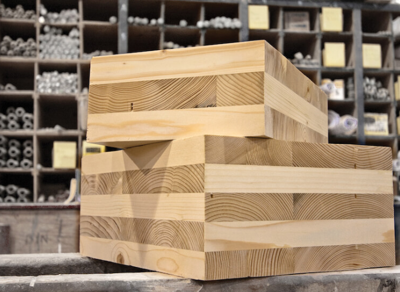
U.S. Economic Development Administration (EDA) has awarded the Oregon Mass Timber Coalition (OMTC) $41.4 million to develop and expand Oregon’s emerging Mass Timber industry.
This grant through the Build Back Better Regional Challenge, is specifically focused on utilizing mass timber products in prefabricated, modular home construction.
The Department of Land Conservation and Development (DLCD) is utilizing a portion of the funding through this grant to help cities update and modernize local development codes to encourage the use of mass timber modular housing through the Code-UP project.
Working with a consulting team and the Department of Consumer and Business Services in 2022, DLCD staff and a consulting team audited the development codes of five cities to identify local regulatory barriers to developing mass timber and modular housing. Starting this fall, the Code-UP project team will continue this work by providing additional jurisdictions with code audits, amendment recommendations, and community engagement services.
Ten jurisdictions that have been selected to receive technical assistance this year: Chiloquin, Clatsop County, Creswell, Gates, Lincoln City, Mt. Vernon, Phoenix, Rufus, Sandy, and Talent. Consistent with the federal grant award, staff prioritized assistance to wildfire-affected and rural communities.
DLCD is committed to assisting a total of thirty jurisdictions over the next five years through a model code funded by the grant and encourages communities to reach out with interest.
Next Steps
Project consultants MIG and Cascadia Partners, DLCD’s Mass Timber Coordinator, and DLCD specialists and regional staff will support the Code-UP project team to complete the following tasks for each selected community.
Provide Adoption-Ready Code Amendments: Consultants will audit local code to understand potential barriers and opportunities for modular mass timber housing and prepare draft code amendments based off those findings.
Engage Community Members Equitably: Consultants will gather local data and information to assist in engaging traditionally underserved communities. They and DLCD staff will use a range of methods to engage community members.
Provide Additional Capacity: DLCD regional representatives and the AmeriCorps Resource Assistance for Rural Environments Mass Timber Coordinator will assist in local planning commission and city council work sessions and adoption hearings.
Oregon’s statewide land use planning program — originated in 1973 under Senate Bill 100 — protects farm and forest lands, conserves natural resources, promotes livable communities, facilitates orderly and efficient development, helps coordination among local governments, and enables community engagement.
The program affords all Oregonians predictability and sustainability to the development process by ensuring allocation of urban land for industrial, commercial, and housing development.
The Department of Land Conservation and Development (DLCD) administers the program. A seven-member volunteer citizen board known as the Land Conservation and Development Commission (LCDC) guides DLCD.
Under the program, all cities and counties have adopted comprehensive plans that meet mandatory state standards. The standards are 19 Statewide Planning Goals that deal with land use, development, housing, transportation, and conservation of natural resources. Technical assistance in the form of grants to local jurisdictions is a key element of the program.
This article first appeared on Cannon Beach Gazette and is republished here under a Creative Commons license.